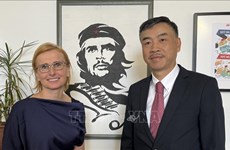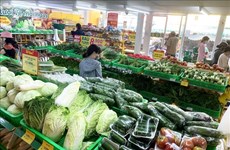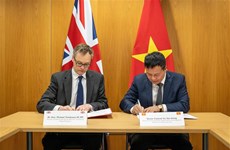ARF 17 takes place in Hanoi
The 17 th ASEAN Regional Forum (ARF), the last ministerial meeting
within the framework of the 43 rd ASEAN ministerial meetings and
related meetings, took place in Hanoi on July 23 under the
chairmanship of Vietnamese Deputy Prime Minister and Minister of Foreign
Affairs Pham Gia Khiem.
The 17 th ASEAN Regional Forum (ARF), the last ministerial meeting
within the framework of the 43 rd ASEAN ministerial meetings and
related meetings, took place in Hanoi on July 23 under the
chairmanship of Vietnamese Deputy Prime Minister and Minister of Foreign
Affairs Pham Gia Khiem.
The event, comprising of a retreat session and a plenary session, was attended by foreign ministers and heads of delegations of 27 ARF participants.
The ministers have exchanged views on international and regional issues of common interest, reviewed the process of cooperation in the past year and mapped out future direction of the forum for the years to come.
The ARF participants reiterated their support for ASEAN to continue playing an important role in promoting cooperation and dialogue for confidence building in the region; stressing the importance of bringing into full play ASEAN’s established mechanisms and instruments for peace and regional stability, namely the Treaty of Amity and Cooperation in Southeast Asia (TAC), Treaty on the Southeast Asia Nuclear Weapon-Free Zone (SEANWFZ), Declaration on the Conduct of Parties in the East Sea (DOC) and the ARF.
Sharing views on the shaping of the regional architecture, the ARF participants expressed their support for ASEAN’s central role; welcomed ASEAN’s efforts in encouraging and promoting deeper engagement of dialogue partners in the regional cooperation process, including the participation of Russia and the US in the East Asia Summit with appropriate times and arrangements.
On regional situation, the ministers expressed deep concern about the Cheonan incident on March 26 and extended condolences to the Government of the Republic of Korea for the loss of lives; called on all concerned parties to exercise self-restraint and resolve all disputes by peaceful means. They also encouraged the parties to return to the six-party talks with a view to achieving the denuclearisation of the Korean Peninsula for its lasting peace and stability.
The ministers were briefed by Myanmar on recent developments in the country, including preparations for the upcoming general election. They expressed hope that the election will take place in a free and fair manner with the participation of parties which would lay the foundation for the long term stability and development of the country. The participants also extended their support to Myanmar to work with ASEAN and the United Nations in the process of national reconciliation as well as the country’s development.
The ministers stressed the importance of maintaining peace, security and stability in the East Sea ; reaffirmed their support for the effective implementation of the Declaration on the Conduct of Parties in the East Sea (DOC), towards the eventual conclusion of a Regional Code of Conduct in the East Sea (COC) in the future. They called on strengthening dialogue, promoting confidence building among concerned parties, as well as resolving disputes by peaceful means in conformity with the spirit of the DOC and recognised principles of international law including the United Nations Convention on the Law of the Sea (UNCLOS).
On future direction of the ARF process, the ministers reaffirmed that ARF remains the key forum to discuss political and security issues in the region with ASEAN at the central position, while continuing to be one of the pivotal elements in an evolving regional architecture. The ministers emphasized the need for ARF to maintain its relevance and become more action-oriented in addressing multi-dimensional challenges, especially the non-traditional security threats such as climate change, disaster, and maritime security.
The ARF participants agreed and adopted the Hanoi Action Plan to implement the ARF Vision Statement, which contains concrete and practical goals and measures to build a peaceful, stable and prosperous ARF area by 2020.
The ministers also adopted a list of 17 cooperative activities for the period of 2010-2011. All ARF participants agreed on the need to further promote cooperation towards preventive diplomacy alongside the conduct of confidence building measures; better improve modalities and strengthen effective ARF’s activities; increase coordination in sharing information and enhance policy transparency, cooperate in dealing with non-traditional security challenges; intensify linkages between Track I and Track II as well as encourage deeper participation of senior defence officials at this forum.
Accordingly, the ministers agreed to adopt the ARF Annual Security Outlook Standardised Format (ASO); the Work Plan on Disaster Relief; the Work Plan on Counter-terrorism and Transnational Crime and the Work Plan on Maritime Security. They tasked senior officials to work on possible ways to strengthen the ARF Unit as part of the ASEAN Secretariat.
The forum closed with the issue of a Chairman’s Statement on outcomes of the forum.
On the same day, ASEAN foreign ministers witnessed the Signing Ceremony of the Instrument of Accession to the Treaty of Amity and Cooperation (TAC) by Canada and Turkey ; and signed with the TAC High Contracting Parties the Third Protocol amending TAC to allow for the accession of EU to the Treaty./.
The event, comprising of a retreat session and a plenary session, was attended by foreign ministers and heads of delegations of 27 ARF participants.
The ministers have exchanged views on international and regional issues of common interest, reviewed the process of cooperation in the past year and mapped out future direction of the forum for the years to come.
The ARF participants reiterated their support for ASEAN to continue playing an important role in promoting cooperation and dialogue for confidence building in the region; stressing the importance of bringing into full play ASEAN’s established mechanisms and instruments for peace and regional stability, namely the Treaty of Amity and Cooperation in Southeast Asia (TAC), Treaty on the Southeast Asia Nuclear Weapon-Free Zone (SEANWFZ), Declaration on the Conduct of Parties in the East Sea (DOC) and the ARF.
Sharing views on the shaping of the regional architecture, the ARF participants expressed their support for ASEAN’s central role; welcomed ASEAN’s efforts in encouraging and promoting deeper engagement of dialogue partners in the regional cooperation process, including the participation of Russia and the US in the East Asia Summit with appropriate times and arrangements.
On regional situation, the ministers expressed deep concern about the Cheonan incident on March 26 and extended condolences to the Government of the Republic of Korea for the loss of lives; called on all concerned parties to exercise self-restraint and resolve all disputes by peaceful means. They also encouraged the parties to return to the six-party talks with a view to achieving the denuclearisation of the Korean Peninsula for its lasting peace and stability.
The ministers were briefed by Myanmar on recent developments in the country, including preparations for the upcoming general election. They expressed hope that the election will take place in a free and fair manner with the participation of parties which would lay the foundation for the long term stability and development of the country. The participants also extended their support to Myanmar to work with ASEAN and the United Nations in the process of national reconciliation as well as the country’s development.
The ministers stressed the importance of maintaining peace, security and stability in the East Sea ; reaffirmed their support for the effective implementation of the Declaration on the Conduct of Parties in the East Sea (DOC), towards the eventual conclusion of a Regional Code of Conduct in the East Sea (COC) in the future. They called on strengthening dialogue, promoting confidence building among concerned parties, as well as resolving disputes by peaceful means in conformity with the spirit of the DOC and recognised principles of international law including the United Nations Convention on the Law of the Sea (UNCLOS).
On future direction of the ARF process, the ministers reaffirmed that ARF remains the key forum to discuss political and security issues in the region with ASEAN at the central position, while continuing to be one of the pivotal elements in an evolving regional architecture. The ministers emphasized the need for ARF to maintain its relevance and become more action-oriented in addressing multi-dimensional challenges, especially the non-traditional security threats such as climate change, disaster, and maritime security.
The ARF participants agreed and adopted the Hanoi Action Plan to implement the ARF Vision Statement, which contains concrete and practical goals and measures to build a peaceful, stable and prosperous ARF area by 2020.
The ministers also adopted a list of 17 cooperative activities for the period of 2010-2011. All ARF participants agreed on the need to further promote cooperation towards preventive diplomacy alongside the conduct of confidence building measures; better improve modalities and strengthen effective ARF’s activities; increase coordination in sharing information and enhance policy transparency, cooperate in dealing with non-traditional security challenges; intensify linkages between Track I and Track II as well as encourage deeper participation of senior defence officials at this forum.
Accordingly, the ministers agreed to adopt the ARF Annual Security Outlook Standardised Format (ASO); the Work Plan on Disaster Relief; the Work Plan on Counter-terrorism and Transnational Crime and the Work Plan on Maritime Security. They tasked senior officials to work on possible ways to strengthen the ARF Unit as part of the ASEAN Secretariat.
The forum closed with the issue of a Chairman’s Statement on outcomes of the forum.
On the same day, ASEAN foreign ministers witnessed the Signing Ceremony of the Instrument of Accession to the Treaty of Amity and Cooperation (TAC) by Canada and Turkey ; and signed with the TAC High Contracting Parties the Third Protocol amending TAC to allow for the accession of EU to the Treaty./.













